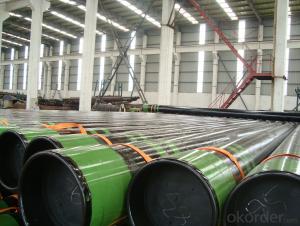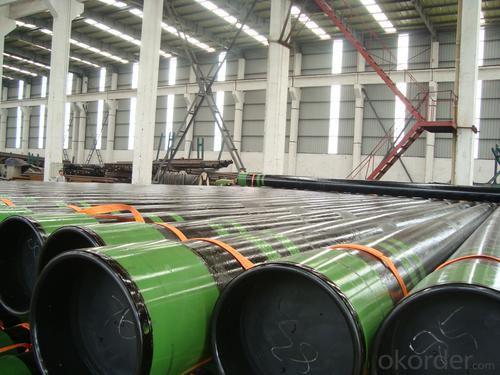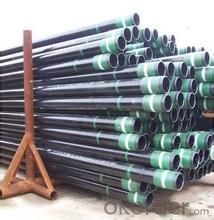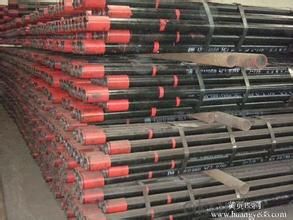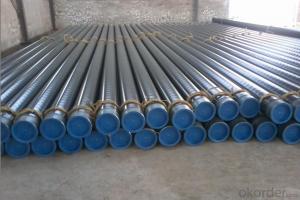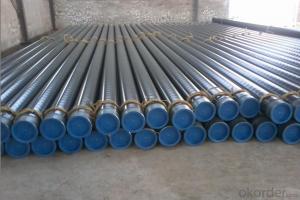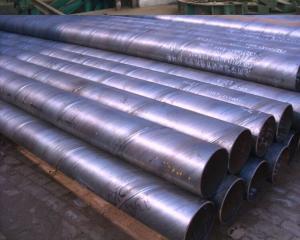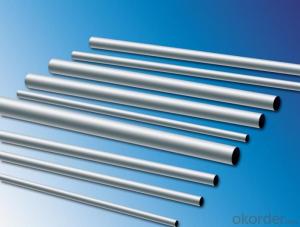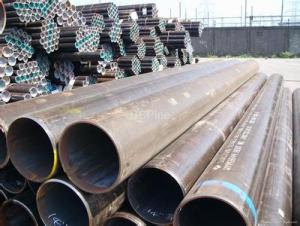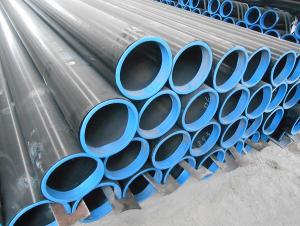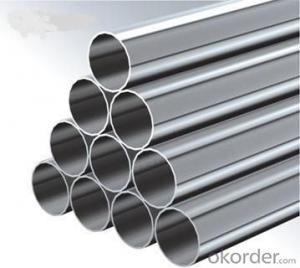Seamless Casing Steel Pipe 2
- Loading Port:
- China Main Port
- Payment Terms:
- TT or LC
- Min Order Qty:
- -
- Supply Capability:
- -
OKorder Service Pledge
OKorder Financial Service
You Might Also Like
1. Seamless Casing Steel Pipe Specifications
1) Grade:H-40,J-55,K-55,N-80,C-75,L-80,C-90,C-95,P-110,Q-125
2) Size: 4 1/2", 5", 5 1/2", 6 5/8", 7", 7 5/8", 9 5/8", 10 3/4", 13 3/8", 16", 18 5/8", 20"
3) Wall thickness: 5.11 - 16.13 mm
4) Clasp Type : STC, LTC, BTC
5) Length : R1,R2,R3
6) Products comply with API SPEC 5CT standards, and use for API 5CT emblem
2. Round thread casing coupling size quality and tolerance:
Code | Specification | Diameter W /mm | Min Length | Boring diameter /mm | Width of bearing surferingb/mm | Weight | ||
Diameter D /mm | Short coupling Nl | Coupling length Nl | short couping | Coupling length | ||||
4-1/2 | 114.30 | 127.00 | 158.75 | 177.80 | 116.68 | 3.97 | 3.62 | 4.15 |
5 | 127.00 | 141.30 | 165.10 | 196.85 | 129.38 | 4.76 | 4.66 | 5.75 |
5-1/2 | 139.70 | 153.67 | 171.45 | 203.20 | 142.08 | 3.18 | 5.23 | 6.42 |
6-5/8 | 168.26 | 187.71 | 184.15 | 222.25 | 170.66 | 6.35 | 9.12 | 11.34 |
7 | 177.80 | 194.46 | 184.15 | 228.60 | 180.18 | 4.76 | 8.39 | 10.83 |
7-5/8 | 193.70 | 215.90 | 190.50 | 234.95 | 197.64 | 5.56 | 12.30 | 15.63 |
8-5/8 | 219.08 | 244.48 | 196.85 | 254.00 | 223.04 | 6.35 | 16.23 | 21.67 |
9-5/8 | 244.48 | 269.88 | 196.85 | 266.70 | 248.44 | 6.35 | 18.03 | 25.45 |
10-3/4 | 273.05 | 298.45 | 203.20 | --- | 277.02 | 6.35 | 20.78 | --- |
11-3/4 | 298.45 | 323.85 | 203.20 | --- | 302.42 | 6.35 | 22.64 | --- |
13-3/8 | 339.72 | 365.12 | 203.20 | --- | 343.69 | 5.56 | 25.66 | --- |
Chemical composition:
Standard codes | Models of steel tubes | Chemical compositions | ||||||||||
C | Si | Mn | P | S | Cr | Ni | Cu | Mo | V | Als | ||
API SPEC 5CT | J55K55 | 0.340.39 | 0.200.35 | 1.251.50 | ≤0.020 | ≤0.015 | ≤0.15 | ≤0.20 | ≤0.20 | ≤0.020 | ||
N80 | 0.340.38 | 0.200.35 | 1.451.70 | ≤0.020 | ≤0.015 | ≤0.15 | 0.110.16 | ≤0.020 | ||||
L80(13Cr) | 0.150.22 | ≤1.00 | 0.251.00 | ≤0.020 | ≤0.010 | 12.014.0 | ≤0.20 | ≤0.20 | ≤0.020 | |||
P110 | 0.260.35 | 0.170.37 | 0.400.70 | ≤0.020 | ≤0.010 | 0.801.10 | ≤0.20 | ≤0.20 | 0.150.25 | ≤0.08 | ≤0.0 | |
3. FAQ of Seamless Casing Steel Pipe:
①How is the quality of your products?
Our products are manufactured strictly according to national and internaional standard, and we take a test on every pipe before delivered out. If you want see our quality certifications and all kinds of testing report, please just ask us for it.
Guaranteed: If products’ quality don’t accord to discription as we give or the promise before you place order, we promise 100% refund.
②How about price?
Yes, we are factory and be able to give you lowest price below market one, and we have a policy that “ for saving time and absolutely honest business attitude, we quote as lowest as possible for any customer, and discount can be given according to quantity”,if you like bargain and factory price is not low enough as you think, just don’t waste your time.Please trust the quotation we would give you, it is professional one.
③Why should you chose us?
Chose happens because of quality, then price, We can give you both.Additionally, we can also offer professional products inquiry, products knowledge train(for agents), smooth goods delivery, exellent customer solution proposals.Our service formula: good quality+good price+good service=customer’s trust
SGS test is available, customer inspection before shipping is welcome, third party inspection is no problem.
Any question, pls feel free to contact us !
4、Seamless Casing Steel Pipe Images:
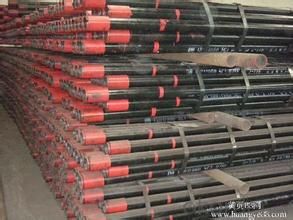
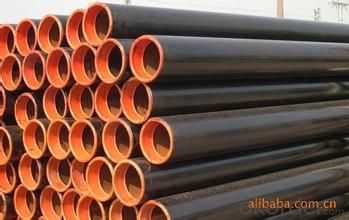
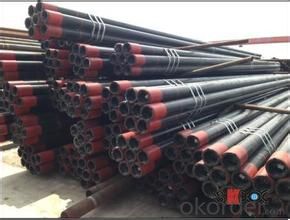
- Q: What are the different testing methods for steel pipes?
- Some of the different testing methods for steel pipes include visual inspection, ultrasonic testing, magnetic particle testing, radiographic testing, and hydrostatic testing.
- Q: Can steel pipes be used for oil wells?
- Yes, steel pipes can be used for oil wells. Steel pipes are highly durable and resistant to corrosion, making them suitable for the harsh conditions and high-pressure environments encountered in oil drilling operations.
- Q: Can steel pipes be used for underground oil and gas pipelines?
- Yes, steel pipes can be used for underground oil and gas pipelines. Steel is a commonly used material for such pipelines due to its strength, durability, and ability to withstand high pressure and extreme temperatures. Additionally, steel pipes can be coated or lined with corrosion-resistant materials to protect them from the corrosive properties of oil and gas.
- Q: What are the different types of steel pipe connections for steam pipelines?
- There are several types of steel pipe connections commonly used for steam pipelines, including threaded connections, flanged connections, welded connections, and grooved connections. Each type has its own advantages and is selected based on factors such as the pipe size, pressure rating, and ease of installation and maintenance.
- Q: What are the main types of steel pipe ah? How to judge which kind of steel pipe performance is better?
- Sort by connectionThe connection way of steel pipe can be divided into: light pipe (pipe end without thread) and wire tube (Guan Duan with thread).The tube can be divided into ordinary tube and end tube.Thickening of the tube can also be divided into: extra thick (with external thread), internal thickening (with internal thread) and inside and outside thickening (with internal and external thread) and other vehicle wire tube.The wire tube can also be divided into ordinary cylinder or taper thread and special thread.In addition, according to user needs, wire tubes are generally equipped with pipe delivery.Plating characteristicsAccording to the characteristics of surface coated steel pipe can be divided into: Clarinet (not coated) and coating tube.The coating tubes include galvanized pipes, aluminium plated tubes, chrome plated pipes, aluminized tubes and other alloy layers.The coating tube has an outer coating tube, an inner coating tube and an inner and outer coating pipe. The commonly used coatings are plastics, epoxy resins, coal tar, epoxy resins, and various glass based anticorrosive coatings. Galvanized pipe is divided into KBG pipe, JDG pipe, threaded pipe, etc.
- Q: What is the role of steel pipe manufacturers in sustainable development?
- The role of steel pipe manufacturers in sustainable development is to promote environmental responsibility and resource efficiency throughout the production process. They play a crucial role in reducing carbon emissions by adopting cleaner technologies, optimizing energy consumption, and implementing waste management strategies. Additionally, steel pipe manufacturers can contribute to sustainable development by prioritizing the use of recycled materials, supporting recycling initiatives, and ensuring their products have a long lifespan to minimize waste generation. By embracing sustainable practices, steel pipe manufacturers can help create a more sustainable future for the construction and infrastructure industries.
- Q: Are steel pipes suitable for chemical processing plants?
- Due to their exceptional strength, durability, and corrosion resistance, steel pipes find common usage in chemical processing plants. Particularly, stainless steel or alloy steel pipes possess the ability to endure high temperatures, pressure, and the corrosive impact of various chemicals. Consequently, they serve as a suitable means for the safe and efficient transportation and containment of diverse chemical substances. Moreover, the installation, maintenance, and repair of steel pipes are hassle-free, rendering them a cost-effective option for chemical processing plants. Nonetheless, it remains crucial to carefully select the appropriate steel type, taking into account factors such as the specific chemicals being processed, operating conditions, and any potential risks or compatibility issues. Regular inspections and maintenance are also vital for ensuring the integrity and performance of steel pipes in chemical processing plants.
- Q: What are the different wall thicknesses available for steel pipes?
- There are various wall thicknesses available for steel pipes, depending on the specific requirements and applications. Steel pipes come in different schedules, which indicate the wall thickness. The most common wall thicknesses for steel pipes are Schedule 40, Schedule 80, and Schedule 160. Schedule 40 steel pipes have a relatively medium wall thickness and are commonly used for general-purpose applications, such as conveying fluids and gases. They are suitable for low-pressure systems and are widely used in plumbing, HVAC, and irrigation systems. Schedule 80 steel pipes have a thicker wall compared to Schedule 40 pipes and are designed for high-pressure applications. They are commonly used in industrial settings, oil and gas pipelines, and high-pressure fluid transport systems. The increased wall thickness provides higher strength and durability to withstand the pressure. Schedule 160 steel pipes have the thickest wall among the commonly available options. They are designed for extremely high-pressure applications, such as in refineries, chemical plants, and power generation facilities. These pipes provide exceptional strength and can handle the intense pressure and stress found in these industrial environments. Apart from these standard schedules, there are also other wall thicknesses available for specific purposes. For example, extra-strong (XS) pipes have a thicker wall than Schedule 80 pipes and are used for applications that require even higher pressure resistance. It is important to consult with professionals or refer to industry standards to determine the appropriate wall thickness for a specific application. Factors such as fluid or gas pressure, temperature, and environmental conditions should be considered when selecting the appropriate steel pipe with the desired wall thickness.
- Q: Is it good to buy a simple wardrobe or a steel pipe?
- If the home place is big, buy Wooden, good-looking durable, if the place is small, buy cloth, easy to receive, mobile, tidy and cheap.
- Q: How are steel pipes used in the manufacturing of agricultural machinery and equipment?
- Steel pipes are widely used in the manufacturing of agricultural machinery and equipment due to their various beneficial properties. These pipes are utilized in several ways to enhance the efficiency and durability of agricultural machinery. One of the primary uses of steel pipes in agricultural machinery is for the construction of frames and chassis. The high strength and structural integrity of steel pipes make them ideal for supporting heavy loads and withstanding the rigorous conditions often encountered in agricultural operations. Whether it is a tractor, combine harvester, or tillage equipment, steel pipe frames provide the necessary stability and sturdiness required for these machines to perform efficiently in the field. Steel pipes are also commonly used in the hydraulic systems of agricultural machinery. These pipes serve as conduits for hydraulic fluids, allowing for the smooth and reliable operation of various components such as hydraulic cylinders, pumps, and motors. Due to their resistance to corrosion and high pressure, steel pipes ensure the longevity of hydraulic systems, reducing maintenance and repair costs for agricultural machinery. Furthermore, steel pipes find applications in the exhaust systems of agricultural equipment. The exhaust gases produced by engines need to be safely and efficiently expelled to minimize environmental impact and maintain engine performance. Steel pipes with appropriate thickness and thermal resistance are used to construct exhaust systems, allowing for the effective removal of exhaust gases and reducing noise pollution. In addition, steel pipes are utilized in the manufacturing of irrigation systems and equipment used in agriculture. Whether it is for transporting water from a source to the fields or distributing water to crops through sprinklers or drip irrigation, steel pipes offer the necessary durability and resistance to pressure, ensuring efficient water delivery and minimizing leaks. Overall, the use of steel pipes in the manufacturing of agricultural machinery and equipment is crucial for enhancing their performance, durability, and efficiency. The strength, structural integrity, resistance to corrosion, and high pressure capabilities of steel pipes make them indispensable components in various applications within the agricultural sector.
Send your message to us
Seamless Casing Steel Pipe 2
- Loading Port:
- China Main Port
- Payment Terms:
- TT or LC
- Min Order Qty:
- -
- Supply Capability:
- -
OKorder Service Pledge
OKorder Financial Service
Similar products
Hot products
Hot Searches
Related keywords
